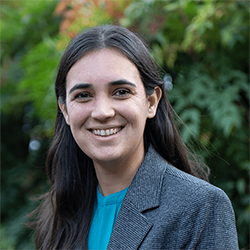Astro Seminar: Kate Alexander: Cosmic Extremes: Time-Domain Astrophysics in a Multi-Messenger World

When:
Tuesday, April 12, 2022
4:00 PM - 5:00 PM CT
Where: 1800 Sherman Avenue, Room 7-600, Evanston, IL 60201 map it
Audience: Faculty/Staff - Student - Post Docs/Docs - Graduate Students
Contact:
Samantha Westlake
Group: Physics and Astronomy Astrophysics Seminars
Category: Academic
Description:
Abstract: Neutron stars and black holes provide laboratories to study extreme physics and shape diverse astrophysical phenomena, from the origin of heavy elements like gold to the regulation of galaxy growth. Time-domain astronomy provides a unique window into the birth, growth, and deaths of these objects. I will discuss my ongoing work on the formation and structure of relativistic jets and outflows in the most extreme astrophysical transients, including gamma-ray bursts (GRBs; powerful jets launched by the deaths of massive stars or the mergers of neutron stars and black holes) and tidal disruption events (TDEs; the shredding of stars by supermassive black holes). I will show that radio data provide the best constraints on the immediate environments of these transients, probing models of black hole growth and accretion (TDEs) and stellar evolution models (GRBs). Finally, I will discuss the bright future of time-domain astrophysics, driven by new observational capabilities. Through the pioneering detections of gravitational waves, astronomers and physicists have gained a new, complementary tool to study compact object mergers, with implications for fields as wide-ranging as general relativity, nuclear physics, cosmology, and shock physics. Collaboration with LIGO and its successor gravitational wave observatories will enable precision constraints on merger physics, while wide-field surveys like Rubin Observatory's LSST will provide the first large samples of rare, relativistic events and move transient science into the statistical realm. Simultaneously, new radio interferometers like the ngVLA and the Square Kilometer Array are poised to transform radio astronomy, revealing the radio sky in unprecedented depth and leading to the discovery of relativistic transient populations in the radio band.
Speaker: Kate Alexander, CIERA Postdoctoral Fellow, Northwestern University